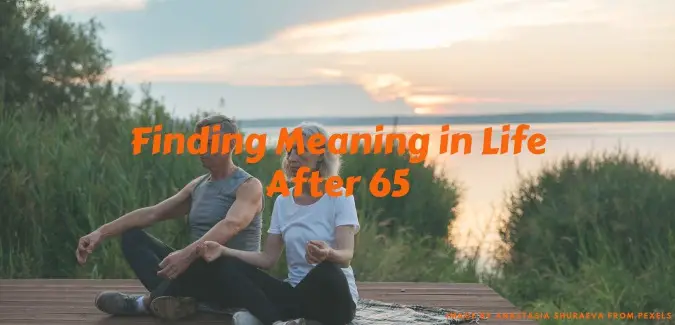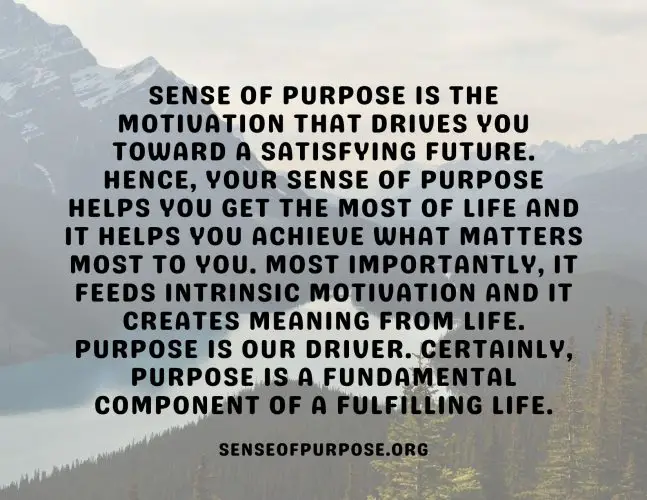Finding meaning in life after 65 is really about living purposefully. This requires understanding what’s important and striving to always do your best. When your days are filled with meaningful and fulfilling activities, you’re in control of your long-term happiness.
Retirement is when you stop living for work and begin working at living. From my perspective, these should be the best years of our lives.
This post contains affiliate links. As an Amazon Associate, any qualifying purchases you make through these links may earn us a small commission, at no extra cost to you.
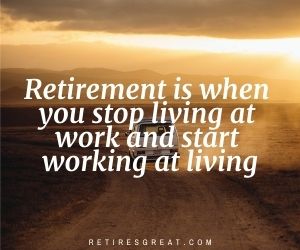
The challenge is most of us have never really thought about things like living purposefully. Throughout our working years, we were too busy raising children, earning a pay check and all the daily distractions.
Everything changes in retirement. The pace slows and alarm clocks are a thing of the past. After a while, the days can begin to blur and run together. Boredom creeps in and you might feel like you’re stagnating.
We need a sense of purpose to keep us growing and moving forward.
The Meaning of Purpose
Achieving a sense of purpose helps you understand the meaning of life and what’s most important to you. When you live purposefully, each day counts as you grow as a person and experience fulfillment.
A simpler way of stating it, it’s the reason you get out of bed.
What do you look forward to each day?
What Influences Your Sense of Purpose?
According to Psychreg, there are four key factors influencing meaning and purpose in life. These are:
When these are in balance, meaning and purpose begin to fall in place.
Benefits of Finding Meaning in Life After 65
As sad as it sounds, most of us need a reason to get off our butts. While it’s great to slow down and enjoy life, after awhile, it’s tough to get moving again.
There’s an eerie parallel with Newton’s First Law of Motion. Basically, a body at rest will remain at rest unless force is applied.
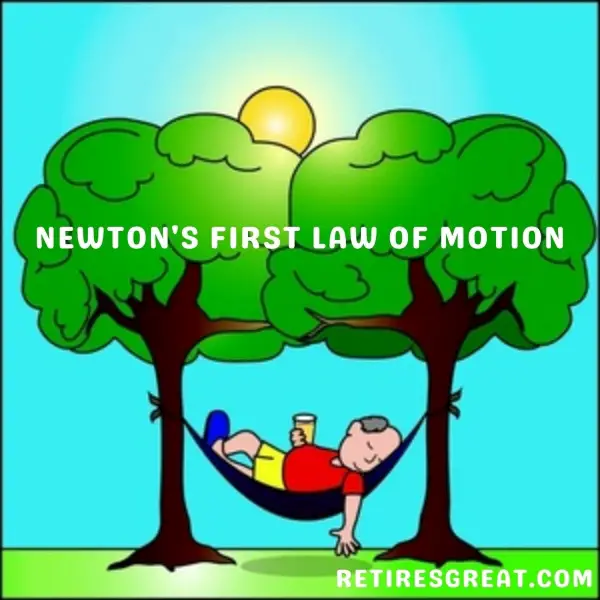
Free Hammock Clipart Image 0515 1005 1302 0827 Computer Clipart
The traditional view of retirement is putting your feet up and living out your remaining years. That’s a surefire recipe for disaster. Stories abound of retirees who lived lives of misery or even died within a few short years.
Research reveals strong correlations of purpose with longer healthier lives. Other benefits include:
The question then becomes, how do you live more purposefully?
What's Important to You?
Wouldn’t it be nice to have a drop-down menu listing everything important to you? Unfortunately, it doesn’t work quite that way as each person is unique. Each and everyone of us has different desires, interests and needs.
One person might find volunteering for a charity to be completely fulfilling. Whereas someone else would be immersed in restoring vintage automobiles. Moreover, over time the things we value evolve.
For example, working hard and getting ahead may have been your driving force in the past. After retiring, that loses importance. The challenge then becomes, what motivates you?
What Makes You Tick?
After retiring, it can seem everything changes, yet you’re still the same person. This is a major life event and better understanding your values is helpful.
I found an enlightening free quiz (no email required) at Personalvalu. Out of 62 traits, you choose 10 or more. Then the test presents two traits and you decide which one is most important to you.
It takes about five minutes to complete and identifies your top five values.
Mine were:
Your Inner Compass
Your core values provide an inner compass aligning with what feels right for you. In spite of this, often we get caught up in external expectations.
For instance, just because some of your friends are into golf memberships / fishing boats / expensive travel doesn’t necessarily mean that’s for you. Yet, we tend to try to “fit in” and be part of the crowd.
When you’re not true to yourself, everything feels off kilter.
As I’ll discuss further in the success stories, volunteering for a worthy cause can be highly empowering.
An example is Freedom for Fido. While the charity improves the lives of dogs, in another respect, it deepens community bonds. A worthy cause and also a social event.
Getting Rid of Roadblocks
Isn’t it interesting that the greatest obstacle in life is usually ourselves? Whether it’s that little voice telling us we’re not good enough or just plain old complacency. The majority of the time we’re our own worst enemy.
Rediscovering purpose requires time to reflect on what’s important and what’s holding you back. Most of our lives we were filled with busyness such as holding down a job, raising children and so much more.
We never had the opportunity to even think about what we wanted down the road. Yet retirement is also when so many get stuck. This could be due to assumptions, self limiting believes or loss of identity.
Assumption Everything Will Be Wonderful
Most retirement advice focuses on financial preparation. In this regard, most folks believe if they set aside enough money, life will be good. Some even believe money does buy happiness.
Considering an estimated 85% of workers dislike their jobs, it’s not surprising retirement is viewed as the holy grail. The opportunity to shed the stress and finally relax.
As most of us will survive another 20 – 30 years, these should be the best years of life.
This isn’t always the case with boredom and loneliness plaguing many retirees. Our post The Ultimate Guide on Things to Do in Retirement addresses these issues to become more active and engaged.
Instead of thinking of all the reasons you can’t do something, let's remove those obstacles.
Self-Limiting Beliefs
Almost everyone has a self-limiting belief of some sort. Young Shannon was certainly no lady’s man. In fact, I was awkward and shy, especially toward the female gender.
Fortunately, I got over it. Otherwise, I wouldn’t be married today!
Some people believe they don’t deserve to be loved or to find happiness! Again, this usually stems from those formative years. This one is particularly nasty as it guarantees a miserable existence until addressed.
One of the greatest fears is outliving your savings. Some individuals never plan on retiring. One of our posts was on Why You Should Never Retire. Unfortunately, this choice can be taken away due to health issues or job loss.
Depending upon what is holding you back, discussing it with a spouse / friend can help. Self-help books are another option. In more severe cases, professional counselling might be considered.
Loss of Identity
Think of someone who was highly successful, taking great pride in their many accomplishments. Perhaps they were a high-ranking executive or a first responder dealing with life and death situations.
They were important and after retiring are often the ones struggling the most. The problem is many folks’ identities became intertwined with what they did. In effect, their purpose was driven by their career.
Until they can redefine and accept themselves for the individual they are, achieving a sense of purpose will be hit and miss at best.
In our post on Loss of Identity, we go deeper into this issue and how to address it.
Rediscovering Your Passion
The term passion reflects what really excites you and feels right. After a lifetime of work, most people have no idea where to start.
Standard retirement advice is to find a hobby or other interest. Great advice and we all should have interests and things we enjoy doing.
More frequently, nothing really appeals, so why bother? Or, you try something and after a while get bored with it. How do we find something we’re passionate about?
Awakening Your Inner Child
Who didn’t have hopes and dreams of what we might become as we grew up? Most of these idyllic thoughts were shrugged off as impractical. But these captivated your interest and came easily to you.
Taking my wife as an example, she had a natural talent for drawing. By Grade 7, she wanted to be a cartoonist. Of course, reality set in and she settled on a proper career.
If it wasn’t for our website, she might never have reconnected with her creative side. I'm proud of her as she’s the one behind all our images. That long forgotten interest in drawing has evolved into developing graphic design skills.
Digging Deeper into Your Aptitudes
Sometimes, you can’t think of anything that interested you in your childhood. Another free quiz (no email required) from Human Metrics is the Jung typology test which reveals aptitudes and personality types.
Amazingly, my wife and I both got the same result! Hopefully, that means we’re compatible. What was surprising was how accurate they were in assessing us.
Try Something New
Hopefully you’ve got a better feel on what inspires and interests you.
If you’re still uncertain, check out courses. There are a multitude available on almost every imaginable topic. Whether it be online or in person, there’s something for almost everyone. What appeals to you most?
Another option is focusing on physical activity. Pickleball is all the rage, what a great way to get active and have fun. Plus, you’ll meet new people.
You might want to get involved in your community. Perhaps volunteer for a specific event and see if you enjoy it. You might find your passion is more related to the people as opposed to the activity itself.
Finding a passion is seldom a “magic bullet” solution. In fact, our interests often evolve over time. It’s about doing something you enjoy. In general, the associated social connections are what make it meaningful.
Finding Your Tribe
No one likes doing things by themselves.
Our connections with others are paramount in finding meaning in life after 65. Generally, after leaving work, our social circles shrink dramatically. Work friendships dissipate and even close friends move away, get sick or worse.
Finding meaning and purpose is often complicated by determining how we fit in. Without a “community” of like-minded people, the risk of feeling socially isolated and unmotivated increases.
How Others View You
Are you upbeat and willing to lend a helping hand? You’ll have a far greater impact when you’re positive and supportive of others. This will also attract and inspire others to make each day a little better.
We all know someone who can best be described as a “miserable old cuss”. They say misery loves company which is nothing more than a downward spiral of negativity.
Our post How Do You Want to Be Remembered discusses this in greater depth. As our time on earth is finite, I’d much rather be thought of someone who makes a difference.
Ways to Expand Your Social Connections
Once you’ve found something you’re at least interested in, you’ll want to connect with others. For instance, a friend of ours is passionate about motorbikes and recently purchased a Harley Davidson.
The only issue, she has no one to ride with. The good news, she joined a Facebook group of riders and this weekend set off on her first group ride.
Another option is checking out local Meet Up groups. You’ll meet interesting people who share your interests. Our post Surefire Ways to Make Friends provides insights on how to connect and deepen friendships.
Worthy of Your Time and Effort
One of the greatest challenges is doing something worthy of your time and effort. Let’s say you volunteer at a homeless shelter.
Certainly, a noble cause, but you might feel you’re working your ass off and no one seems to appreciate it. You go home exhausted and not sure it even made a difference.
The sands of time are trickling for each of us and we need something meaningful to do. Filling our days with busyness and things which don’t matter is like treading water.
The Difference Between a Hobby and a Passion
The difference between a hobby and passion is your engagement. The difference it makes in your life. Is it a hobby that’s mildly interesting or a passion?
For instance, woodworking is a hobby of mine. Over the years I’ve completed significant projects such as my DIY Kitchen Renovation.
Yet, for me, it’s a hobby as opposed to an all-consuming passion. Heck, if I was working on a project everyday, it’d start to feel like work or a chore. All the fun and pleasure would be gone.
Success Stories of Finding Purpose in Retirement
Living a purposeful and rewarding life can mean many different things. Generally, it involves finding something you genuinely enjoy, that’s worthwhile and connects with others.
On this basis, the following are success stories of finding purpose in retirement.
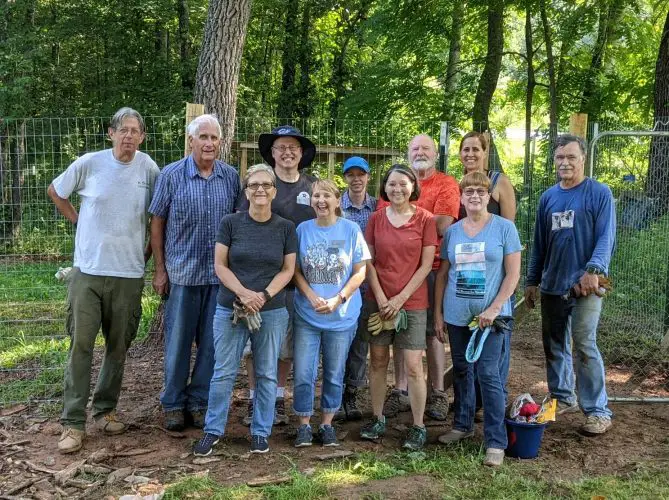
Closing Thoughts on Finding Meaning in Life After 65
Turning 65, and retirement for that matter, is a major life event. Many will struggle with this transition while entering the final third of their lives. How we use choose to use our remaining time is completely up to each and everyone of us.
Finding meaning and purpose requires intent to understand ourselves and what’s important. There’ll be obstacles and challenges to discovering your passion. Once found, it’ll be worthy of your time and others will share in the journey.
In a nutshell, finding meaning in life is really about living purposefully.

